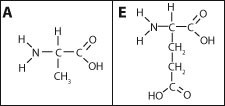About 530 million years ago, what adaptation evolved to make fish the dominant predators of the sea?
A) Jaws
B) Fins
C) Sensory organs
D) Scales
E) Internal skeleton
E
You might also like to view...
After estrogen binds to receptors, these estrogen receptors gain ______ activity.
A. phospholipase B. phosphatase C. transcription factor D. GTP binding E. protein kinase
Trace the flow of blood entirely through both the pulmonary and systemic circulations. Start and end with the right
atrium. Be sure to list all structures through which the blood will pass, including all valves and major blood vessels entering and exiting the heart. What will be an ideal response?
Exocrine glands have no ducts and secrete their hormones into the surrounding interstial fluid or blood. Indicate whether the statement is true or false
The A159E mutation causes an A amino acid to be replaced with an E amino acid (their structures are shown here). What effects do you think the A159E mutation will have on the troponin protein?

A) The mutation will not affect troponin function since both the A and E amino acids are hydrophobic and thus the troponin structure will not be affected.
B) The mutation will probably make troponin more stable at low pH and at higher temperatures since the E amino acid is acidic.
C) Since the E amino acid is hydrophilic, it will try to be exposed on the surface of the protein and thus will disrupt the tertiary structure and potentially the function of troponin.
D) If the A amino acid is replaced by the basic E amino acid, then the secondary and tertiary structures will be affected and troponin will likely not fold correctly.